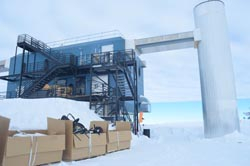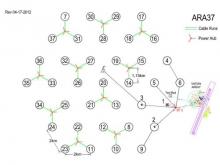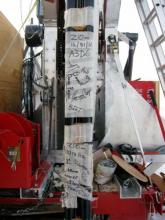What Are They Doing?

IceCube is located in Antarctica because the huge amount of dense ice under the South Pole contains many protons that can be hit by passing neutrinos, and the ice is transparent, so the resulting light can be detected by sensors. IceCube is made up of 4200 sensitive light detectors embedded in the ice at depths between 1450 and 2450 meters (4700-8000 feet). The sensors are deployed on "strings" of 60 modules each, into holes 60 cm in diameter in the ice melted using a hot-water drill. Encompassing a cubic kilometer of ice, IceCube expands on an existing experiment that started detecting neutrinos at the South Pole in 1997. When IceCube is complete, it may detect up to 300,000 neutrinos a year for up to 20 years.
The data collected will be used to make a "neutrino map" of the universe and to learn more about astronomical phenomena, like gamma-ray bursts, black holes, exploding stars, and other aspects of nuclear and particle physics. However, the true potential of IceCube is discovery; the opening of each new astronomical window has led to unexpected discoveries.
Where Are They?

Latest Journals

Dr. Madsen is the chair of the Physics Department at UW-River Falls and Associate Director of the IceCube Neutrino Observatory where he directs the education and outreach program. His research interests include heliophysics and astrophysics, which he has studied at his various projects in Antarctica. In addition to research, Dr. Madsen is committed to reaching a broad audience beyond the research community. He is involved in education and outreach for the IceCube project including professional development courses for teachers and science and math instruction for the UWRF Upward Bound Program. He collaborates with a number of programs and institutions in addition to PolarTREC, including the Knowles Science Teaching Foundation, UW-River Falls Upward Bound and McNair Programs, and service groups (Rotary International, Boy and Girl Scouts, university alumni associations, etc.). You can read more about Dr. Madsen's work here and here.
"Working in Antarctica is a wonderful adventure, and it is great to provide opportunities for others to have this awesome experience."



